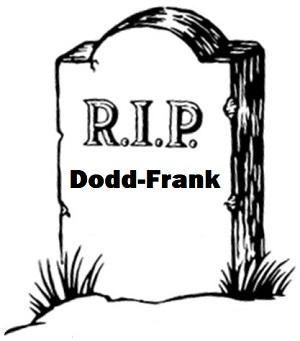R.I.P. Dodd-Frank: Wall Street Is Unleashed — Again
by Pam Martens and Russ Martens, Wall St On Parade:

Yesterday the Office of the Comptroller of the Currency, the regulator of national banks, and the FDIC, which provides the taxpayer-backstopped Federal insurance to deposits at these banks, announced that they were going to “simplify” the Volcker Rule. Under the Trump administration, “simplify” is code for “gut.”
The Volcker Rule was part of the 2010 financial reform legislation known as Dodd-Frank. It outlawed deposit-taking banks from using those deposits to make wild gambles for the house, known as proprietary trading. It also required the banks to end their ownership of hedge funds and private equity funds where the banks can secretly dump losing positions or hide enormous losses in hard to price instruments.
Wall Street hated the Volcker Rule so much that it made sure the rule never came into being. It has stonewalled the implementation of the rule for nine years and one month. Now the rule has been stripped of all of its meaningful components.
The gutting of the Volcker Rule was snuck through in the dog days of summer as families are busy getting kids ready to return to school. Five years ago, as families were busy preparing for the Christmas holidays, Citigroup’s lobbyists pushed through the repeal of the second most important aspect of Dodd-Frank. It was called the “push-out” rule which would have forced banks to move their tens of trillions of dollars in derivatives out of the Federally-insured bank unit into another unit that could be placed into bankruptcy or wound-down in the event of insolvency.
By keeping these dangerous derivatives in the Federally-insured bank, Wall Street effectively guaranteed itself another bailout if it blew up the U.S. economy again.
Vox explained on December 17, 2014 how the dirty deal on the “push-out” rule went down:
“Not surprisingly, Citigroup, which was responsible for writing the bill, led the way with 30 lobbying reports mentioning H.R. 992, followed by the American Bankers Association at 17 reports, Principal Financial Group at 13, the U.S. Chamber of Commerce and the Securities Industry and Financial Markets Association (SIFMA) at 12, and JP Morgan and Bank of America at nine.
“Unions and diffuse interest groups like Public Citizen and Demos and the Leadership Conference on Civil Rights show up a few times. But they are simply dwarfed by the corporate lobbyists. By my count, the corporate lobbyists filed a total of 196 reports. The diffuse interests and unions combined filed only 13. That’s a ratio of 15 to 1.”
Citigroup had become insolvent in 2008 and had lied about its exposure to subprime debt. Instead of it being wound down by the government, it received the largest bailout in U.S. history with over $45 billion in taxpayer funds infused as equity and an additional $2.5 trillion in secret, low-cost loans from the Federal Reserve. What it did in 2014 was to effectively gut the very legislation that was designed to prevent it from going rogue again.
Senator Elizabeth Warren led the outcry in 2014, delivering three impassioned speeches on the Senate floor, appealing to members of Congress to strip the Citigroup lobbyists’ provision from the must-pass government spending bill to which it was attached. (See video below.) Despite her appeals, the provision passed. Then, and now, too many members of the U.S. Congress are terrified of getting on the wrong side of Wall Street.
The outcry came swiftly yesterday from public interest groups and watchdogs over the gutting of the Volcker Rule. Gregg Gelzinis, policy analyst for economic policy at the Center for American Progress, released the following statement:
“The Volcker rule was established to reorient banks toward serving businesses and households instead of taking swing-for-the-fences trading bets with taxpayer-backed deposits. Today’s finalized revisions to this pillar of financial reform severely undermine that core principle.
“The final rule narrows the trading activity covered by the Volcker rule and waters down or eliminates critical regulatory protections designed to prevent banks from abusing exemptions for hedging, market-making, and other permitted activities. As a result, Wall Street banks will be able to exploit these changes and engage in the type of high-risk proprietary trading that the Volcker rule was explicitly intended to prohibit. The revisions represent a forceful endorsement of the dangerous philosophy of Wall Street self-regulation.
“Gutting the Volcker rule will generate more risk in the banking system, just as other deregulatory changes to capital requirements, liquidity rules, stress tests, and living wills would weaken banks’ ability to safely handle risk. Taxpayers, workers, and families will again foot the bill when this toxic mix goes south.”
Congresswoman Maxine Waters, Chair of the House Financial Services Committee, issued the following statement:
“The Volcker Rule is a cornerstone of Wall Street reform that Congress passed in the wake of the 2008 financial crisis to prevent federally-insured, deposit-taking banks from engaging in risky, speculative activities, like owning hedge funds and private equity funds, on the backs of the American taxpayers. I am deeply concerned by today’s FDIC and OCC actions, and potential additional votes by other regulators, to weaken this critically important rule….”
Dennis M. Kelleher, President and Chief Executive Officer of Better Markets, issued the following statement in anticipation of the rule changes:
“Champagne corks are no doubt popping on Wall Street today as the most dangerous too-big-to-fail banks celebrate what will be their biggest victory since being bailed out during the 2008 financial crisis: the gutting of the Volcker Rule ban on propriety trading. That will be great for Wall Street bonuses, but tragic for taxpayers…
Read More @ WallStOnParade.com
Loading...



